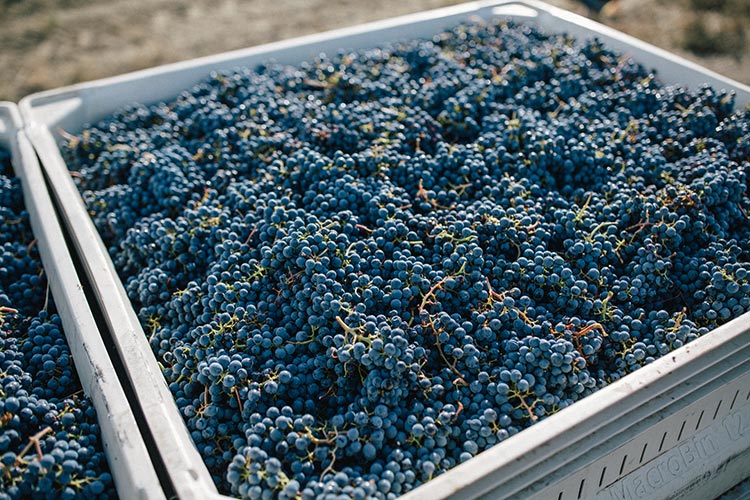For nearly half a century, Kiona Vineyards on Red Mountain has been farmed by grower Scott Williams and his family, whose wine grapes are a prized commodity and used by 60-plus wineries
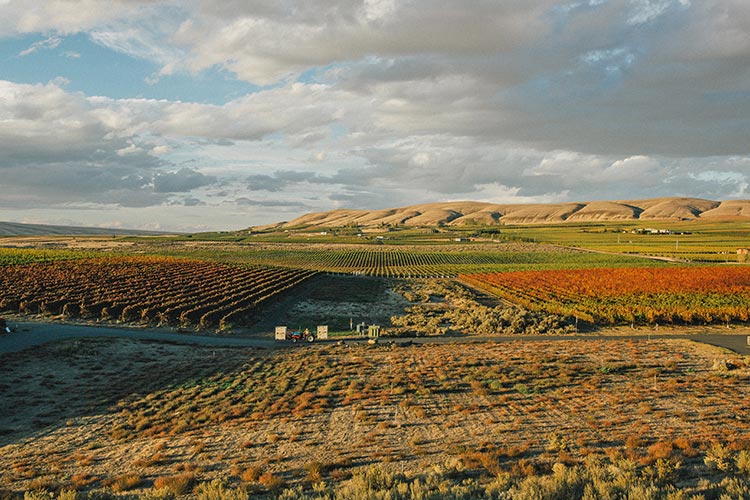
Editor’s note: Click here to read reviews on 16 Kiona Vineyard designated wines.
Written by editor John Vitale
“I DIDN’T START out to be a visionary. I started out to just survive and support my family,” admits Scott Williams of Kiona Vineyards with true modesty. The 60-year-old winegrape grower has left behind a wake of sweat and family values on the vineyard-studded slopes of the Red Mountain AVA where he and his family have been carving a groundbreaking path since the mid-1970s. After a lifetime spent with his shoulder to the proverbial wheel, the results are paying off.
“Over the years we could have sold a number of times and probably been financially better off than I am now,” says Williams. Kiona Vineyards’ holdings include 270 acres of plantings in the AVA, on some of the most sought-after terroir in the country. But cashing out was never an option for Scott and his wife Vicky—they had a different vision, one that included a sustainable and stable future. Today both of their grown sons, JJ and Tyler, are essential to running the third-generation family business that was started from scratch nearly a half century ago by Scott’s father, the legendary John Williams (along with his best friend and pioneer Jim Holmes of Ciel du Cheval Vineyard).
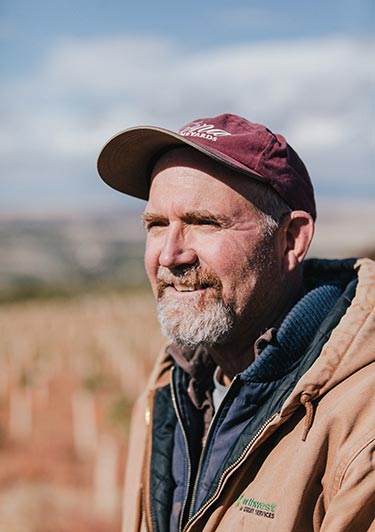
Most of Kiona’s business decisions are based on long-term returns rather than immediate ones. That concept appeals to their employees as well, some who have worked on the farm for 30 years and have brought a second-generation member of their family into the workplace. “We have the same vineyards and all of the same labor for long enough to learn how to do it, and hopefully we get a little better every year. And that kind of stability is not very common in any business,” says Scott, who moved to Red Mountain to manage Kiona Vineyards fulltime in 1984 after he and Vicky got married. Their home was situated at the dead end of the main drag called Sunset Road—still dirt then, not paved like today. At the time, vineyards covered barely a few dozen acres of the tumbleweed and sagebrush-covered desert landscape, a stark contrast to the 2,000-plus acres of lush vineyards that have spread throughout the AVA in recent times.
When the first Red Mountain vines were planted at Kiona in 1975, Scott was in his junior year in high school and lent muscle to help break ground. Scott earned a degree in Agricultural Engineering at WSU and has spent practically his entire adulthood managing Kiona Vineyards, grooming it into an acclaimed powerhouse as interest in the Red Mountain AVA began to slowly rise over the decades. “It changes your perspective a little bit, especially when you see what’s going on around here now,” says Scott. “I can pretty much guarantee I’m the only guy out here that pulled sagebrush with a chain and a tractor,” he adds with a hearty chuckle.
Both Grower & Winemaker
The surge in the number of wine designates crafted by top winemakers around the state is a testament to Scott’s astute abilities as both grower and winemaker. In fact he has been named as the Honorary Grower for the 2019 Auction of Washington Wines by a group of industry peers.
Where other established vineyards on Red Mountain garnered high praise from winemakers early on, Kiona was slower to draw attention in this arena because, as an estate winery, they used every bit of their coveted grapes. In essence, their fruit was off limits to others.
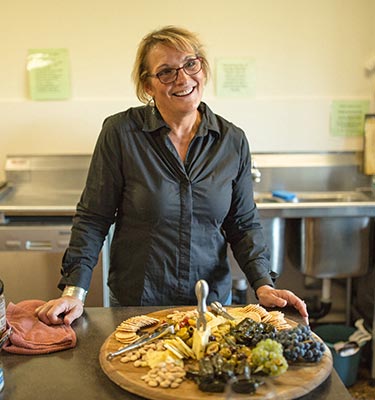
“If you back up in time 20 years and look at the prominence of Klipsun Vineyard and Ciel du Cheval versus Kiona, there was a perception that those vineyards were higher tier. But in reality, they were not wineries—so they weren’t using their grapes,” Scott rightly points out. “Our vineyard was pretty small at that time and we were using them all. So where it was one winery beating the drum now it’s become 40 or 50.” Scott farms enough land now that his winery uses about half the estate grapes and he sells the rest to dozens of other wineries.
Demand for Kiona’s fruit began to really pick up when Scott was able to begin developing a 200-acre chunk of land called Heart of the Hill Vineyard, smack in the center of the AVA and right next to Col Solare winery. Part of the process involved selling some land to Col Solare and forging a symbiotic relationship with their neighbor to jointly secure much-needed water rights to the property. Scott felt good knowing the Italy-based Antinori family (co-owner of Col Solare) had been family owned for 26 generations. He says the notion of working with a neighbor who was in it for the long haul, like himself, was appealing.
The first block of Heart of the Hill went into the ground in 2006, and Scott planted 20 acres every year for the next ten years like clockwork. “We would plant 20 acres and get it into production—then once you start that cycle you always have 20 acres coming. We often would make the first wines off of them and then show that to people who were interested in buying our grapes. It was sort of an organic, very steady, very linear growth,” he says.
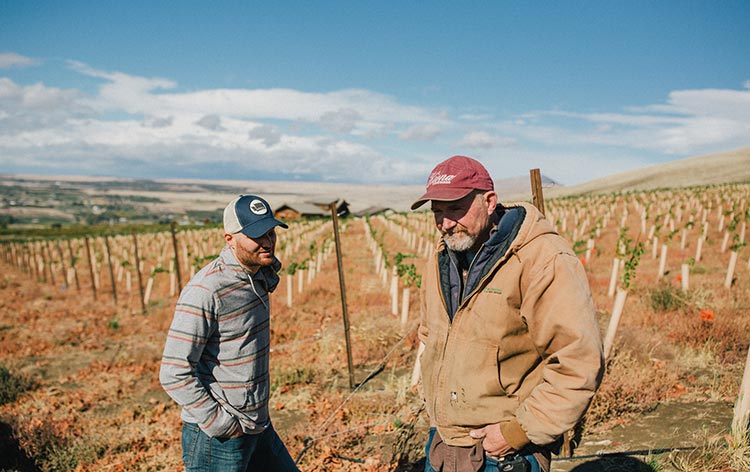
The fact that Scott is in charge of the vineyards and the winemaking is not lost on grape buyers like Mike Methany, who has been buying Kiona fruit since 2013 for a variety of reds he makes with co-owner Lisa Swei at Three of Cups winery in Woodinville. “I consider Scott to be very unique in both that he is grower and winemaker and that is really something when you look at the acreage and production. I truly value Scott and his advice every chance I get some,” says Methany.
History With The Land
When Chris Gorman started his eponymous winery in 2002, his first grapes came from Kiona. “Not only would I get my fruit from Scott, but he would help me process it. He would crush the fruit. So in the early days I would drive my fermenter bins out to Kiona and Scott would pick and crush my fruit right into my bins because I didn’t have a destemmer then,” says Gorman, who has been pulling the same fruit from Kiona for 17 years. “I appreciate that Scott is a ‘yes’ man. He wants you to succeed too, so he does a lot of favors.”
Similar to Gorman, winemaker Lisa Warr-King Packer launched Warr-King Wines with Kiona fruit, the source of her Merlot and Cabernet that go into her delicious Grand Rouge red wine. “Scott has a history with the land, the vineyard and the AVA. He is part of it and carries the grit of the vineyard under his fingernails,” Lisa says. “And Scott is approachable and easy to work with. Being a small-unknown winemaker in 2014, Scott gladly answered my call and sold me my first Red Mountain fruit. He got me hooked and there is no turning back.”
Tim Narby of Nota Bene Cellars in Seattle is also a small producer who is appreciative of extra favors from growers like Kiona. “Scott runs the picked fruit through his Pellenc destemmer to clean it up, then pumps it to our small one ton fermenters. This is super convenient for us,” Tim says, expressing a hope to see other farmers expand machine harvesting in the future. “Labor is such a big issue for everyone and this would be a way to keep more biomass in the vineyard instead of composting it in Seattle.”
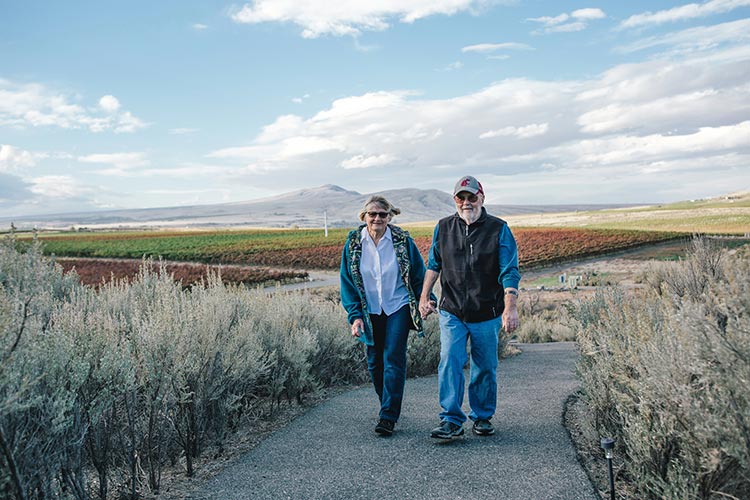
Scott’s decades of cellar experience as Kiona’s winemaker translate into an ability to coax the maximum from the fruit. “At any specific location, every block has its optimum level and it takes a while to figure that out. If you’re not making wine out of it, you don’t know that,” says Scott, who prides himself on knowing the precise crop load and picking date decisions for each block.
Winemaker Billo Naravane at Rasa Vineyards in Walla Walla is a certified Master of Wine who has been working with Kiona Cabernet Sauvignon for a decade. “Scott is a very dedicated grower. He is great at achieving a perfect canopy to fruit ratio, thus giving us optimally ripe grapes each year,” says Naravane.
“The Red Mountain AVA is quite unique in Washington; it provides Cabernet Sauvignon with a lovely signature earthy element and beautifully ripe fruit flavors while maintaining vibrant acidity and a firm, tannic backbone.”
When Chris Dowsett launched Dowsett Family Winery in 2007, he turned to Scott looking for some Mourvèdre to complete a red blend right about the same time Heart of the Hill’s first blocks were ready for harvest. “The Heart of the Hill Vineyard has that great Red Mountain heat for the late ripening Mourvèdre,” Chris says. “Scott has always farmed it beautifully to control the crop on this vine that can make big clusters in some years. Keeping it from over cropping, or getting mold or mildew inside the tight clusters is a chore sometimes, but Scott handles it perfectly for the site.”
Winemakers are usually at the mercy of the farmer to give them the absolute best fruit so they can in turn make the best wine possible. “Red Mountain is filled with sensational farmers,” adds Chris Gorman, who sources close to 90% of all his Gorman red wines from a handful of Red Mountain growers. “Scott’s interesting side is that he’s one of the few grower/winemakers on Red Mountain, so he’s got to think about quality in the vineyard and in the winery,” says Chris Gorman. “Scott’s going to think in many layers and wear many different hats; so I might get less tonnage but I might make better wine, which is always what I want.”
So prized is Kiona’s premium fruit that wineries like Gorman, Rasa Vineyards, Three of Cups, Dowsett Family and numerous others invest their finest barrels, their best fermenters, and pay the most attention to it in the cellar, which elevates the end results.
“What I tell winemakers, for the most part, is that I’m growing these grapes for myself—and you are welcome to have part of them!” chortles Scott. “And people like Chris [Gorman] trust me to do that.”
Kiona Vineyards At-A-Glance
American Viticultural Area:
Red Mountain AVA
Oldest Vines:
1975 plantings of Cabernet Sauvignon, Chardonnay & Riesling
Vineyard Holdings (270 acres total):
Kiona Estate
: plantings from 1975-2002
Ranch at the End of the Road
: plantings from 1978-2016
Heart of the Hill:
plantings from 2006-2014
Artz
: plantings from 1997
Sunset Bench
: plantings from 2004
#1 Grape Varietal:
Cabernet Sauvignon represents 59% of all Kiona fruit, far and away the dominant varietal grown in the Red Mountain AVA
All Kiona varietals, listed in order of volume grown:
Cabernet Sauvignon
Merlot
Lemberger
Syrah
Malbec
Cabernet Franc
Sangiovese
Gewürztraminer
Petit Verdot
Carmènere
Petite Sirah
Chenin Blanc
Chardonnay
Mourvèdre
Sauvignon Blanc
Riesling
Semillon
Zinfandel
Viognier
Roussanne
Wineries Currently Using Fruit From Kiona Vineyards:
Abeja Winery
Amelia Wynn Winery
Auclair Winery
Avennia
Barnard Griffin Winery
Barons Winery
Barrister Winery
Bartholomew Winery
Betz Family Winery
Canvasback
Cascade Cellars
Category 5 Cellars
Chateau Ste. Michelle
Col Solare
Columbia Crest
Cooper Wine Company
Covington Cellars
Descendant Cellars
Devona
Dowsett Family Winery
Eagle Harbor Wine Co.
Efeste
Eleven Winery
Fidelitas
Forgeron Cellars
Fortuity Cellars
Frichette Winery
Genoa Cellars
Gorman Winery
Grosgrain Vineyard
Hard Row to Hoe
Hawkins Cellars
Helioterra
K Vintners
Liberty Lake Cellars
Long Shadows Winery
Lord Lion Winery
Maryhill Winery
Mosquito Fleet Winery
Muret-Gaston
Native Sun
Northstar
Northwest Cellars
Nota Bene Cellars
Orcas Island Winery
Ott & Murphy Wines
Perennial Vintners
Powers Winery
Purple Star
Rasa Vineyards
Remy Wines
Revelry Vintners
Rulo Winery
Seabeck Cellars
Simpatico Cellars
Sovereign Cellars
Sparkman Cellars
Sugar Horse Cellars
Swiftwater Cellars
Syncline Winery
Three of Cups Winery
Truth Teller Winery
Van Vino Winery
Viscon Cellars
Walla Walla Vintners
Ward Johnson Winery
Warr-King Wines
Winescape
Written by John Vitale
Photographed by Travis Gillett

